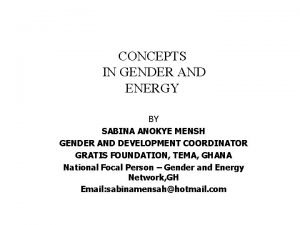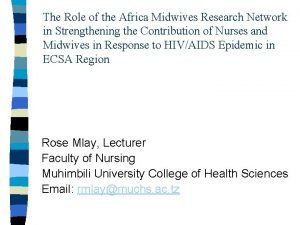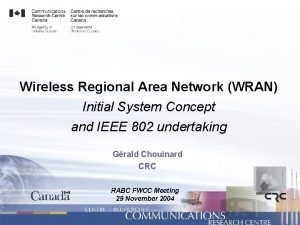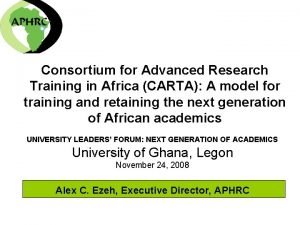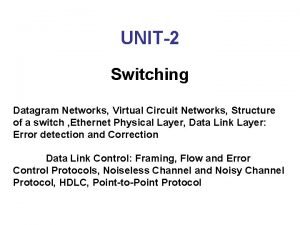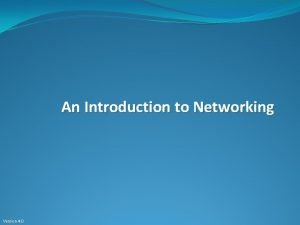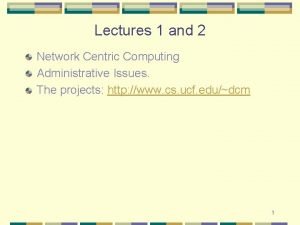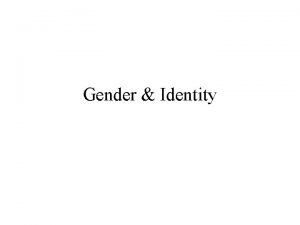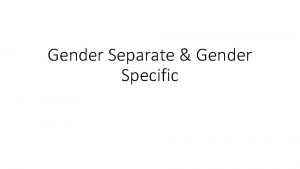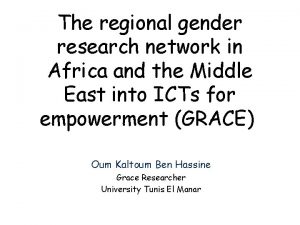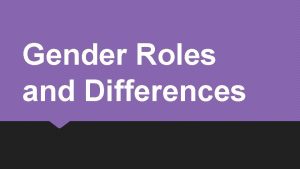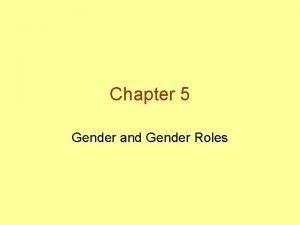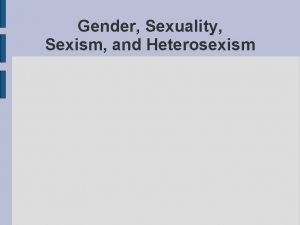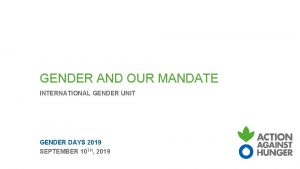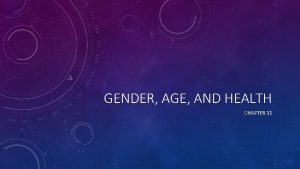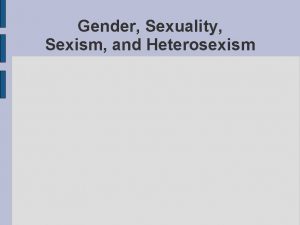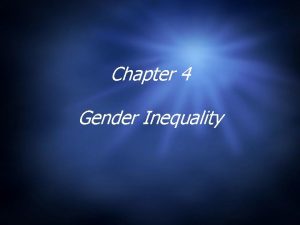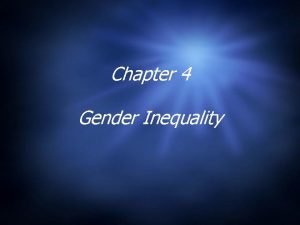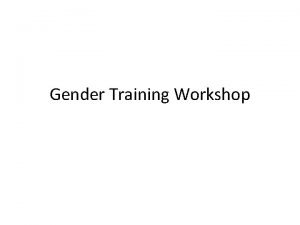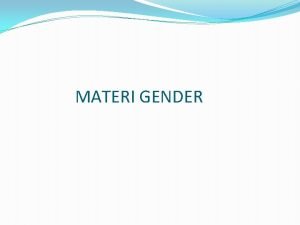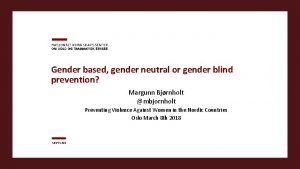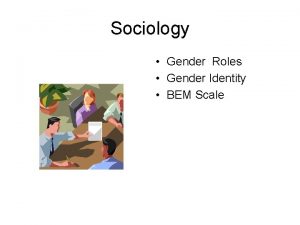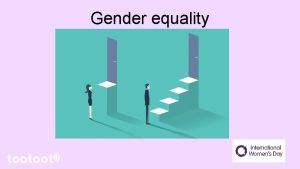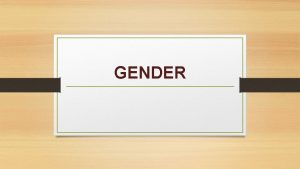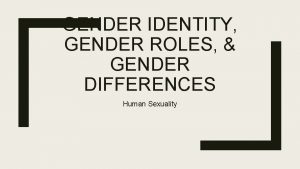The regional gender research network in Africa and































- Slides: 31

The regional gender research network in Africa and the Middle East into ICTs for empowerment (GRACE) Oum Kaltoum Ben Hassine Grace Researcher University Tunis El Manar

http: //www. grace-network. net/

The power of ICTs is their ability to connect people around the world and enable networking and then the emergence of an online community and online working groups, what favour a human development based on a vision of society conducive to empowerment. In this context and starting from the postulate that Access to and use of ICTs is both a gender and a development issue, the Grace network was managed by The GRACE Project Voluntary Association based in South Africa.

History • The Grace network was launched in 2005 on the issue "The ICTs and women's empowerment". • In a first step, Grace network was involved 14 researchers teams from 12 African countries. • Then, in a second stage, which began in 2008, it was expanded to include 14 other researchers teams from 7 countries of the MENA region, .

This has led to the formation of an African and Middle Eastern network of gender and ICT researchers.

Objectives -The formation of a research network for capacity building of researchers in Africa and the MENA region; -The training of research skills for change in various institutions in Africa and MENA region and this by mastering the techniques and methodologies of transformative research, based on a participatory approach (surveys, participant observation, depth interviewing, workshopping, conversation analysis); - The production of knowledge that can influence policy at local and regional level; - The Sharing of knowledge and experiences and learning.

The organisational structure of Grace network includes : - a management team - research teams consisting of team leaders and of researchers

Management team Executive Director Ineke Buskens Project Director Anne Webb Web maintenance Green. Net Translator Fatima Timjerdine GRACE Africa Secretariat Susan Bakesha GRACE MENA Secretariat Arwa Oweis GRACE Administration Tatjana Vukoja Accountant Richard Grant Legal Counsel Grant Marinus

Researchers Almost majority of researchers involved in the network are academics from various specialties (humanities, social sciences, media and information environmental medecine, sciences, nursing life science, economics, sciences, agricultural sciences, chemistry, computer sciences and Gender studies). Some of them are activists of civil society regarding women's rights.

Researchers Team leader Specialty Country Gisele Yitamben Salome Omamo Kazanka Comfort Economy Management Social Sciences & Development Cameroon Kenya Nigeria Ibou Sane Jocelyn Muller Sociology Development Studies (energy) Senegal South Africa Susan Bakesha Kiss Brian Abraham Buhle Mbambo-Thata Gender studies Uganda Media practitioner, trained IT Zambia expert and a cartoonist Documentation and Library Services Zimbabwe Mervat Foda Dairy Science and Technology Egypt Nagwa Abdel Meguid Saneya M. El-Neshawy Egypt Lina Abu Habib Human genetics Agriculture sciences (Post harvest pathology) Nursing sciences American Literature & American Feminism Social Sciences & Gender Studies Vera Baboun Amel Mustafa Mubarak Einas Mahdi Ahmed Ikhlas Nour Oum Kalthoum Ben Hassine Ahlam Hibatulla Ali Rokhsana Ismail Zahra Al-Saqqaf English Literature Agricultural Economics Poultry science Life sciences & Gender Studies Orthodontics Chemistry & Gender Studies English Literature Palestine Sudan Tunisia Yemen Arwa Oweis Rula Quawas Jordan Lebanon

Each network, African and of MENA region, has its own way but they keep between them bidirectional links for sharing and learning. In addition to the interactions between researchers, those between researchers and the coordination team who is specialized in this kind of research were of great wealth.

Research Projects All the individual research projects, which must fit into the general theme of the network (ICTs and women's empowerment) and thus come under the problems of gender and development, are defined by the researchers themselves according to their importance in their respective societies. This has led to a variety of research topics.

Research Projects GRACE Africa I: 14 research projects from 12 African countries Project Country Is the internet an empowering tool for Douala business women, international traders in the textile sector? Can information and communication technologies improve the livelihoods of Egyptian women artisans? The impact of ICTs on women’s career progression and networking in Kenya: The experience of IT professional women Use of cell phones by women business owners to enhance efficiency and effectiveness in their micro-enterprises in Kenya Cameroon Egypt Kenya How do legal centres and associations, as well as women victims of gender-related violence, use ICTs in Morocco? Morocco Women’s use of ICTs in Manhiça and Sussendega: A tool for empowerment? Mozambique How women in rural Nigeria use mobile phones to meet their communication needs? Nigeria

Ownership of mobile phones by businesswomen in Senegal Rethinking energy access: Integrating information and communication technologies and gender for sustainable solutions Senegal South Africa The effects of mobile phones and/or internet services on women entrepreneurs’ socio-economic condition Tanzania ICT liberalization in Uganda: The impact of mobile telephony on women’s socio-economic empowerment. Uganda Uptake and impact of the CD-ROM “Rural Women in Africa: Ideas for Earning Money” on grassroots women entrepreneurs in Uganda by Women of Uganda Network (WOUGNET). Making Life Better Uganda Women and online learning in higher education in Zimbabwe Zambia Zimbabwe

GRACE AFRICA II: 10 research projects from 08 African countries Project Country How does the Mbalmayo FM Women’s community radio function and contribute to the diminishing of discriminatory practices experienced by women? Cameroon What can be done to overcome cybercrime towards women to enable them to exercise their right to communicate without fear of abuse, harassment or violence? Kenya What should ICT companies consider when coming up with policies that make the ICT work environment better and satisfactory for women? How can a first mile technology, the VOIP, be profitably deployed to improve communication access and economic empowerment at the last mile? How will this technology work best for the women farmers to meet their communication and information needs? Kenya Nigeria

How do female political leaders use ICTs to influence and participate in politics in Senegal? Does this use of ICTs contribute to the empowerment of women political leaders; do they use ICTs to cope with a gendered situation; are they maintaining their gendered situation through their use of ICTs? How do girls use the MXit platform to define and co-create their sexuality; and how, given the space for critical reflexivity and interpretative agency, can girls re-define and interpret their sexuality to reflect their perceptions of their authentic well being? How have female radio presenters tapped into the power of the radio and used it to improve their wellbeing and status? How would male gender internet dialogues enhance enlightenment on feminism, gender and development in Zambian society? How can university level computer education contribute to the preparation of women for careers in design and development computing? How can training of women computer science students be instrumental in increasing women graduates’ empowerment so that they have the capacity to select careers in design and development? Senegal South Africa Uganda Zambia Zimbabwe

GRACE MENA: 14 research projects from 07 countries The common denominator of these projects are ICTs & Gender Project Promoting health nutrition and wholesome body image amongst young girls in Egypt through the use of ICTS How can ICTs be used in Egypt to enable mothers of disabled children combat the ensuing stigmatization? How can ICTs be used to assist female landowners in Egypt become active farmers on their land? How can ICTs be used to empower female university students in Jordan in their stance against gender-based violence? How can ICTs be used by young Jordanian women to "unlearn not to speak"? How have ICTs contributed to women's empowerment in rural Lebanon? Country Egypt Jordan Lebanon

How can ICTs be used to enhance gender awareness and resilience in Palestinian female university students? Palestine Is there a gender related difference in the use of ICTs at institutions of higher learning in Sudan? How can ICTs contribute to getting a law against FGM, accepted in Sudan? Sudan How are ICTs used to draw young Sudanese women into pre-marital sexual activities and how can ICTs be used to protect them against this? Sudan Is there a gender difference in access to and use of ICTs at the University of Tunis, Tunisia? Tunisia How can ICTs be used to enhance Yemeni women's sense of self-care pertaining to their reproductive health? Yemen How can ICTs be used to combat genderbased violence against women in Yemen? Yemen How can Yemeni university students use the Internet to enhance their political awareness and participation? Yemen Sudan

All research initiated within the framework of this network try to explore how technology disclosure can change gender realities women in Africa and the MENA Region but also to delimit the experiences of women's empowerment in the context of their gender, economic and political, social, cultural.

The goal of these researches is: building a large body of research on how African and Arab women access to and use ICTs, what will enrich our understanding of development problems in general and of African and Arab development in particular and will influence policies and interventions to help reduce the obstacles women currently encounter.

Working policies - Writing and submitting a proposal - Acceptance, by the coordinators team of the network, of research proposals is a mandatory step. - Training in research methodologies, provided by the Executive & the project Directors of the network during two workshops, of few months of interval (one in Yemen and one in Lebanon for the MENA region network). - Achievement of Field work

- Two training workshops, one on writing and one on Methology analysis (held respectively in Tunis and in Amman for the MENA region network) were then organized; However, most exchanges and communication between the members of the network are made through the Internet (website, mailing list, skype, social networks as facebook and twitter).

All the information on this research network are recorded on the Grace website

GRACE WEBSITE: http: //www. grace-network. net/ BIOGRAPHIES OF RESEARCHERS OUM KALTHOUM BEN HASSINE Researcher, Tunisia Oum Kalthoum Ben Hassine is a Professor of Biology at the University of Tunis and Director of the Research Unit of Biology, Ecology and Parasitology of Aquatic Organisms which consists of 55 researchers and Ph. D students. Dr Oum Kalthoum holds a Scientific Baccalaureate, License in Natural Sciences, Advanced Studies Diploma in Marine Biology and Oceanography, and Doctorate of specialty in Marine Biology and Oceanography & Doctorate d’état ès Sciences. She is the author of many publications in international scientific journals. Oum Kalthoum received the “Mérite de l’Education et des Sciences” award in 2000 and 2008, and the Certificate for exceptional volunteer services, United Nations in 2001. She is a member of the European Academy of Sciences, Arts and Letters. Send an e-mail to Oum Kalthoum. . .

GRACE WEBSITE: http: //www. grace-network. net/ NEWS of RESEARCHERS Inauguration of the Oum Kalthoum Ben Hassine Laboratory of Natural Sciences 12 May 2012 By admin Ineke Buskens participates as a speaker in Bretton Woods Online Webinar; Effectively Applying Mobile Technologies to the World Bank’s Development Planning on 7 th June 2012 By admin Kazanka Comfort of GRACE Nigeria to speak in Ottawa, Toronto and Montreal May 21, 2013 By admin

GRACE WEBSITE: http: //www. grace-network. net/ PUBLICATIONS OF RESEARCHERS GRACE-authored books and chapters, research reports, articles, presentations, interviews and media coverage, and project documents are grouped in these categories and listed by author. The publications are linked if they are available online. Article: La place de la femme tunisienne dans les sciences : analyse de la situation actuelle et perspectives de développement by Oum Kalthoum Ben Hassine published online on http: //www. grace-network. net/.

The findings emerging from these two research phases have been captured in two books.

1 - All of the research conducted within the framework of the first phase of GRACE led to the publication of a book entitled « AFRICAN WOMEN AND ICTs : Investigating Technology, Gender and Empowerment » It explores the ways in which women in Africa utilize ICTs to facilitate their empowerment; whether through the mobile village phone business, through internet use, or through new career and ICT employment opportunities. 2 - The second book is currently being published. : « Changing Selves, Zed/IDRC/UNISA 2009 ISBN 978 -1 -84813 -192 -7 e-ISBN 978 -1 -55250 -399 -7 320 pp. Changing Societies: Women, gender and ICT in Africa and the Middle East » .

Lessons learned The main lesson learned from this experience is that the working in Network, through internet, is a great enrichment for the research and for the researcher by speeding up the communication and the exchange of experiences, information and knowledge, what is of the importance in the field of research. highest

However, from what we have learnt so far, the following ideas can be shared for the purpose of Integrating Arab einfrastructure in a Global Environment, e-AGE 2013: • - empowerment leads women to perceive themselves as capable of understanding decisions and making choices; • - access to ICTs for women empowerment is access to education and to information; • - women empowerment, in both society and work, is supported by ICTs which can provide tools to enable women to make choices about their lives in the household and in the community.

THANK YOU FOR YOUR ATTENTION Grace MENA Researchers
 Strategic gender needs and practical gender needs
Strategic gender needs and practical gender needs Africa midwives research network
Africa midwives research network Regional area network
Regional area network Consortium for advanced research training in africa
Consortium for advanced research training in africa Virtual circuit and datagram networks
Virtual circuit and datagram networks Features of peer to peer network and client server network
Features of peer to peer network and client server network Network centric computing
Network centric computing Hát kết hợp bộ gõ cơ thể
Hát kết hợp bộ gõ cơ thể Frameset trong html5
Frameset trong html5 Bổ thể
Bổ thể Tỉ lệ cơ thể trẻ em
Tỉ lệ cơ thể trẻ em Gấu đi như thế nào
Gấu đi như thế nào Chụp tư thế worms-breton
Chụp tư thế worms-breton Hát lên người ơi
Hát lên người ơi Môn thể thao bắt đầu bằng chữ f
Môn thể thao bắt đầu bằng chữ f Thế nào là hệ số cao nhất
Thế nào là hệ số cao nhất Các châu lục và đại dương trên thế giới
Các châu lục và đại dương trên thế giới Công của trọng lực
Công của trọng lực Trời xanh đây là của chúng ta thể thơ
Trời xanh đây là của chúng ta thể thơ Mật thư tọa độ 5x5
Mật thư tọa độ 5x5 Làm thế nào để 102-1=99
Làm thế nào để 102-1=99 Phản ứng thế ankan
Phản ứng thế ankan Các châu lục và đại dương trên thế giới
Các châu lục và đại dương trên thế giới Thể thơ truyền thống
Thể thơ truyền thống Quá trình desamine hóa có thể tạo ra
Quá trình desamine hóa có thể tạo ra Một số thể thơ truyền thống
Một số thể thơ truyền thống Cái miệng nó xinh thế chỉ nói điều hay thôi
Cái miệng nó xinh thế chỉ nói điều hay thôi Vẽ hình chiếu vuông góc của vật thể sau
Vẽ hình chiếu vuông góc của vật thể sau Nguyên nhân của sự mỏi cơ sinh 8
Nguyên nhân của sự mỏi cơ sinh 8 đặc điểm cơ thể của người tối cổ
đặc điểm cơ thể của người tối cổ Thế nào là giọng cùng tên? *
Thế nào là giọng cùng tên? * Vẽ hình chiếu đứng bằng cạnh của vật thể
Vẽ hình chiếu đứng bằng cạnh của vật thể
